Making sales and bringing in revenues is fascinating.
What’s more fascinating is building a team that replicates your strategy and multiplies those revenues. But only if it was that easy.
Sales managers have to plan their strategy, build and manage teams, and control the execution – all while being aligned with the company’s goals.
Sales management is, sometimes, more difficult than being on the field to make a sale.
After all, you’ve to manage your people, customers, and processes. The responsibilities are huge. But the outcomes are rewarding because you can see your business grow exponentially.
So, if you’re a first-time manager or looking for a fresh perspective on sales management, you’re at the right place.
What is sales management?
Sales management is a process of planning, directing, and controlling the salesforce to achieve business objectives. It involves building a team (recruiting), enabling the sales team, and motivating team members to do well in their jobs.
The different functions of sales management are:
| Planning | Directing | Controlling the execution |
| Building team (recruitment) | Training (process and tools) | Monitoring performance (targets vs. achievements) |
| Goal setting | Assigning targets | Team and individual’s assessment |
| Defining strategy | Enabling teams | Incentives and compensation |
| Forecasting sales | Analytics and reporting |
The purpose of sales management is to align your team towards a common business objective.
If you’re wondering how it helps, read on to find out.
Why is sales management important?
Imagine just blindly going about your day without proper planning. Most of the time, I hardly get things done, as my tasks get overlapped, and I don’t have clarity about what the day is going to be about. However, when I plan my day out well, nine times out of ten, I get a lot more achieved.
That is the same way having a sales management plan would also work. The clearer your goals, the more you would manage to achieve.
- The salesperson would know what is expected of him and would set his short-term targets accordingly.
- The salesperson would be reassured as he has a clear plan to follow and would not need to go about it blindly.
- They will have a person or plan to fall back to if something goes amiss.
Apart from this, you would:
- Know better what to expect from your team
- Be able to set clear goals for your team and analyze their performance
- Predict sales better based on previous data
If you noticed, as a sales manager, you need to manage both – your work and your team.
So, here’s a tip.
Get a nice sales CRM (such as LeadSquared) to manage your contacts, team, and tasks in one place.
So, we’ve seen that sales management is essential. It gives your team a direction and purpose. But the journey of a sales manager comes with its fair share of challenges.
Sales management challenges
Sales managers often feel the pressure of numbers.
Think of it this way. A sales rep has just one target to achieve. But the sales manager has to face the target pressure of the entire team. It’s a multifold pressure.
We asked 91 sales managers about the most challenging aspect of sales management. No surprise, planning (46%) and controlling (34%) tops the list.
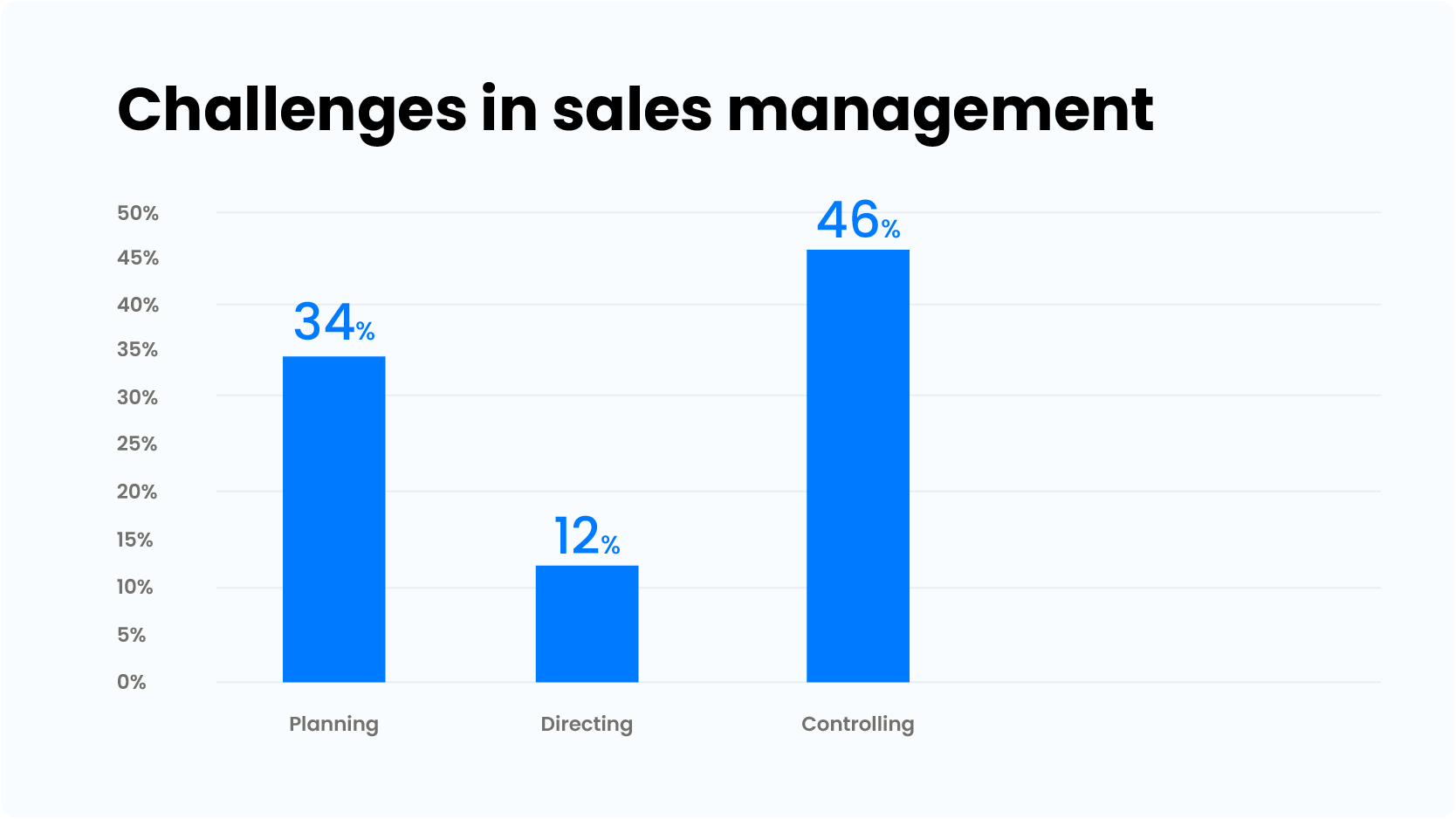
In your career as a sales manager, you’ll come across several challenging (yet manageable) tasks like forecasting sales, tracking sales and individual’s progress, making sure that the team follows the processes and protocols, and many more.
Let me highlight three new challenges that sales managers face these days.
- Ensuring that all customer and sales data resides in the central system.
- Making data-driven decisions. For example, the quality of interactions between sales reps and buyers.
- Keeping track of target vs. achievement. In fact, LeadSquared surveyed 141 sales managers and 30% of them said that tracking assigned vs. achieved goals is very challenging for them.
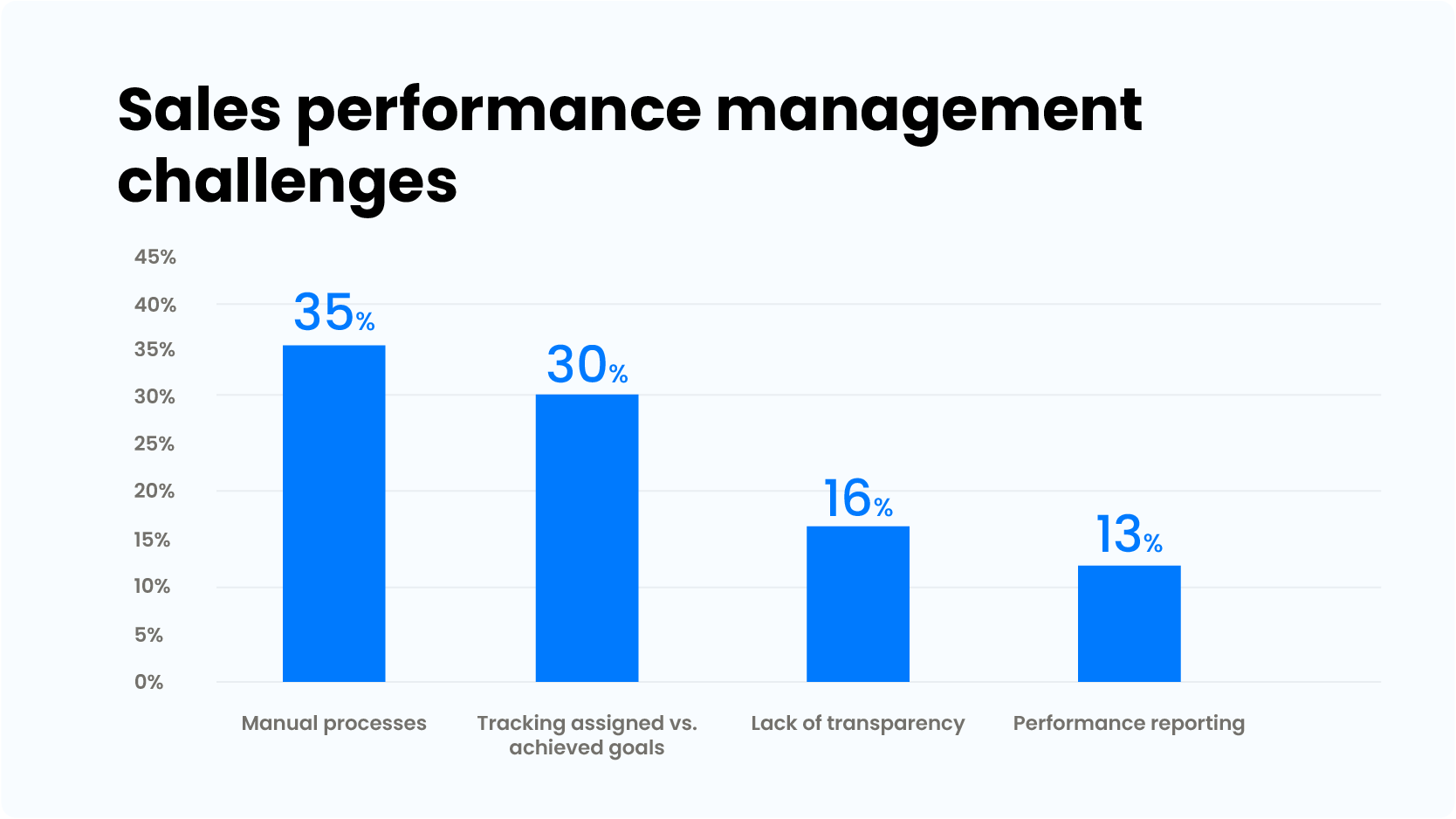
These challenges are common across organizations. However, managers can easily overcome them with the right process and software.
In the next section, I’ll share 7 simple steps to effective sales management and how you can enable your teams to perform better.
A 7-step sales management process for first-time managers
Whether you’re managing a team of 5 or 50, the idea remains the same.
Once you decode the right way to manage a team of 5, you can easily scale it to manage more reps.
So, the 7 steps of sales management will involve:
- Building a team – Plan your requirements, recruit/select team members, assign them targets.
- Targeting – Ensure that the team reaches out to the right prospects.
- Messaging – Ensure every team member is aligned with the business values and propositions.
- Discipline – Make sure that your team members follow the process and are on track to achieve their sales goals.
- Enablement – Ensure your team has the tools and resources to help them close a sale.
- Motivation – Celebrate wins and offer incentives to keep your team motivated.
- Analytics – Your every judgment should be backed by data. Analytics will help you separate emotions from results.
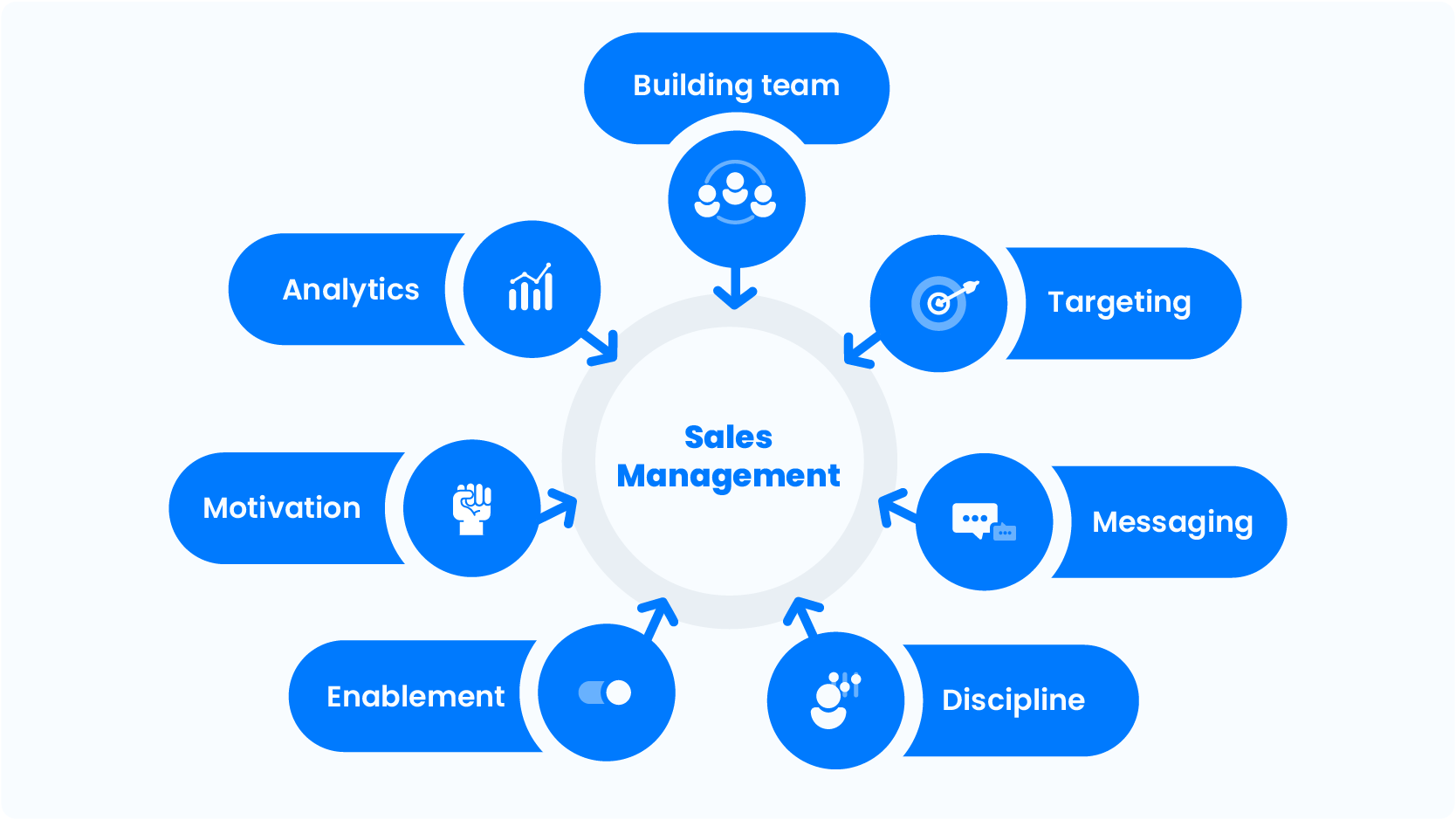
Let’s look at each of these steps in detail.
1. Building a team
The biggest question in front of everyone is – what should be the team size?
I would say it depends on the momentum you want to achieve.
If you recall, in physics, we studied – momentum = mass X velocity.
In the context of sales, we can say, momentum is the revenue you want to bring, mass is your team size, and velocity is previous deals.
Now, if you want to bring $X revenue, and you know your sales velocity (the number of deals you can close per person per month), you can easily determine the number of team members you’ll need.
But not just anyone; recruit skilled and driven people for your team. For this, brainstorm what you want to achieve, shortlist profiles, and ask the right sales interview questions.
Next, spend time and effort in sales onboarding. That is, provide training and resources to equip them with the skills and knowledge required to perform in their newly assigned role.
Once you onboard the best players for your team, the next step is to make them familiar with your product/service, customers, and industry.
Note, if you have software for sales management, train your team to use it. Don’t assume that they’ll learn on their own. Also, don’t just rely on the in-app suggestions or documentation because we have found that about 53% of sales users prefer live training.
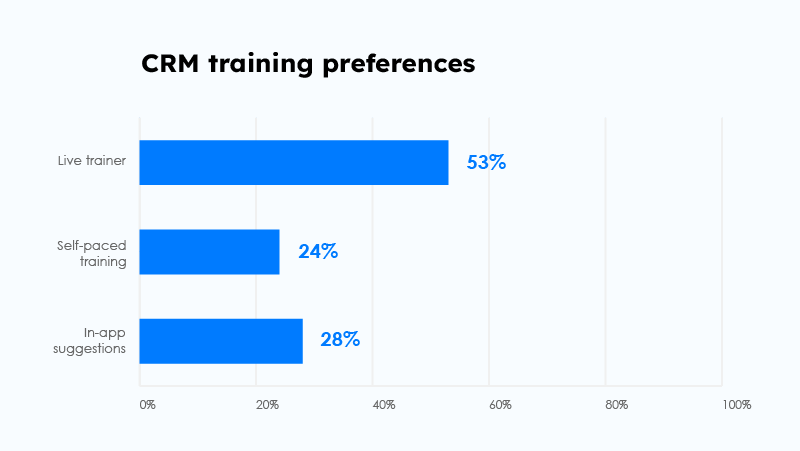
2. Targeting
Recall the famous sales quote of Liz Lange, the founder of Liz Lange Maternity:
“Every brand isn’t for everybody, and everybody isn’t for every brand.”
Similarly, your team must know your target audience inside out. They shouldn’t be chasing every passerby in the street to buy your product.
Right targeting will save their time and effort.
To make targeting right,
- Build a customer profile
- If you sell a range of products, segment your buyers into groups based on their preferences, location, etc.
- Target them based on their stage in the sales pipeline.
3. Messaging
Not understanding their own product/services or the buyer’s companies and needs is an immediate deal-killer, according to the LinkedIn State of Sales Survey 2021 (United States and Canada edition)

Spending time perfecting the sales pitch is worth it as it will bring your reps closer to the deals.
I have a sales enablement expert in my team who audits the email and call quality and suggests improvement. The messaging has to be right. Otherwise, the deal will go nowhere.
4. Discipline
Discipline has helped salespeople close deals faster and increase their incentives over time. Here’s what sales reps say:
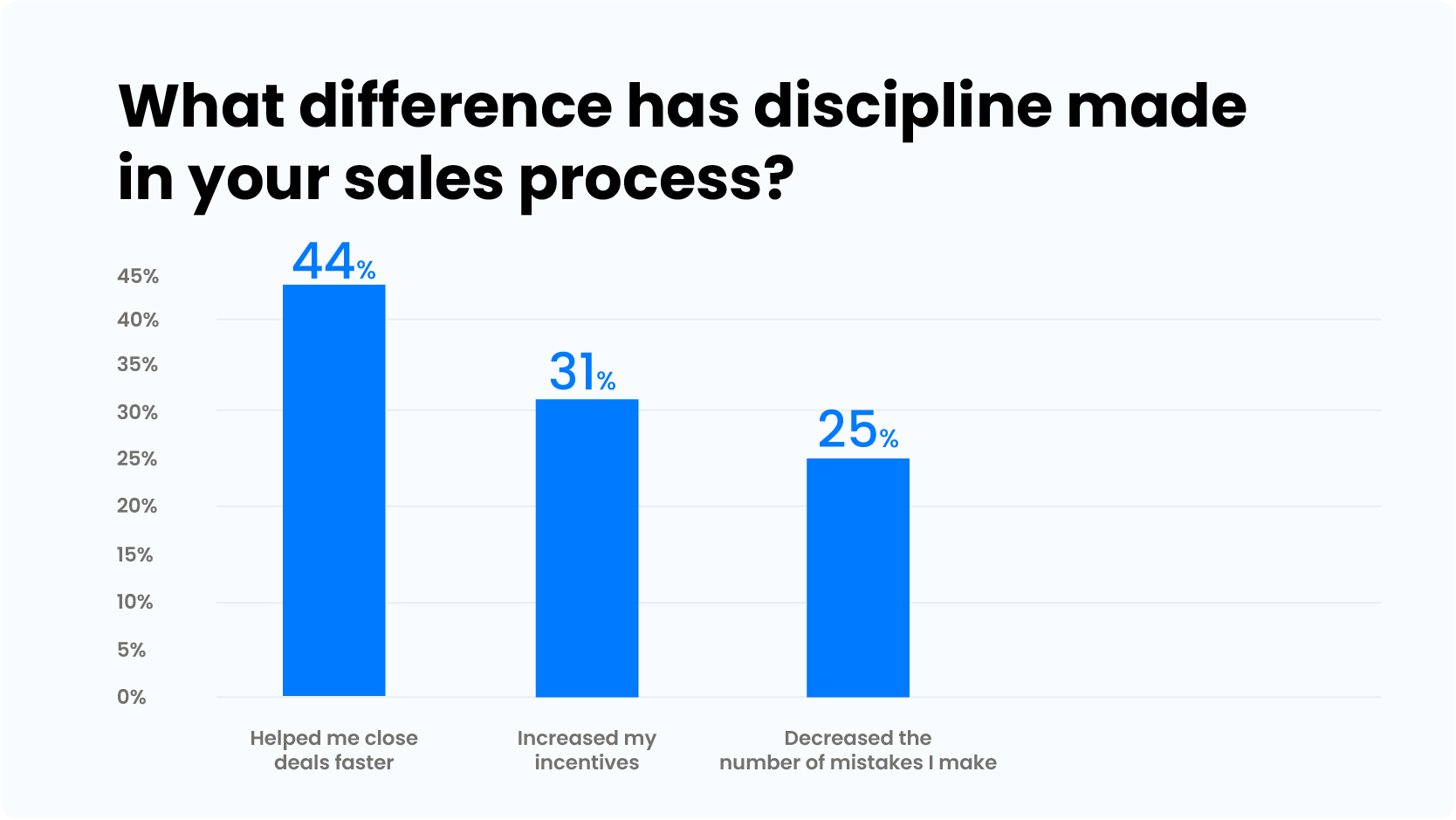
However, discipline without the right targeting and messaging will be a waste.
If your reps are aimlessly calling X leads, just to meet their daily targets, you might be at a loss. If the sales pitch is wrong, you might lose prospects who would have converted if the messaging was right.
Such instances occur when:
- Your team members call the wrong prospects
- They fail to convey the product’s USPs aligned with their use cases (messaging)
This brings us to the next important aspect of sales management – sales enablement.
5. Enablement
Your reps would want to close those deals as much as you do. However, in the real world, they have to deal with several roadblocks.

Sales enablement is removing these roadblocks. It involves equipping your team with the right set of enablement tools, training materials, and resources (content) that can help influence buyers.
Now the question is, how will you know that your team needs help.
The answer lies in the details.
Spend time to analyze their calls and emails with customers. Try to understand if they’ve understood your proposition correctly. Do they have resources to share with buyers that can reinforce their statements? If not, you know what to do.
6. Motivation
Of course, the incentive is the biggest motivation in sales. But people also seek appreciation.
At LeadSquared, we celebrate every win – whether big or small. We often give rewards like – “Best cold caller of the day,” “Best performer of the week,” “Best email,” and so on, along with our regular “Spotlight” and “Star of the Quarter” awards.
In our daily status meeting, we discuss our learnings as well. It eases the tense environment a bit, and salespeople get a chance to learn from their peers.
If 10 people share their learnings with 10 others in the group, everyone will have 10 X 10 learnings.
In short, celebrating smaller wins, a good incentive structure, and sharing learnings with each other have proved beneficial for my sales team.
7. Analytics
“Data informs every step we take. Predictive analytics are helping us to identify potential sales leads. Intent data and social listening are helping us to identify new opportunities. We are also using data for propensity scoring and lead scoring.”
Paul Lewis Global Social, Digital Marketing, and Sales Enablement Lead, Pitney Bowes (via LinkedIn)
Befriend data.
Use your CRM to analyze:
- Customer pain points
- Sales pipeline
- Opportunity to win ratio
- Sales cycle
- Customers – ticket size, region, CLV, etc.
Compare them against your industry benchmarks. Improve your processes based on the story that your data tells.
While we talk about analytics, it’s equally important to track and manage sales performance.
Tips to improve sales performance management
The bottom line of sales figures doesn’t tell you everything you need to know. If you have a team of two people, and each works in their own territory, Salesperson A may make $1 million in sales, while Salesperson B only makes $100.
From those facts alone, you could conclude that Salesperson B needs to be better trained, work harder, and be more convincing to customers.

What might be happening is that your company is selling ice cubes, and Salesperson A sells to California (known for its hot weather) while Salesperson B sells to Alaska (known for, well, ice and snow). If you were to switch territories, Salesperson A may fail to make any sales at all in Alaska, while Salesperson B sells $5 million in California.
It’s only fair to compare the members of your sales team on equal measures. Sales performance management involves the use of reporting at the management level to reveal every intricacy of how each member of the team is performing.
Improving sales performance with automation
You can remove a lot of mundane work (and pressure) from your sales team.
How?
- Monitor the intent of the buyer. If they check your pricing page, open emails from your SDRs, and respond to your calls, they probably are interested in your brand. CRM tools assign scores to leads based on their activities. The lead with a higher score should be called and followed first.
- Automate response. If a visitor drops an inquiry on your website or social media page, send an automated response that your representative will reach out to them soon.
- Follow-up reminders. No rep can remember all the follow-ups/meetings they need to make in a day. CRM can send automated follow-up reminders to reps based on their last conversation and disposition entered in the CRM.
- Drip campaigns. Reps can send an automated sequence of follow-up emails to cold leads.
- Reporting. Reps need not maintain and share their pipeline report with managers. Managers can fetch the reports or monitor the deal pipeline through real-time dashboards.
By automating sales, you’re enabling your team to perform better. That is, they’ll have more time to focus on what they enjoy doing – selling.
Now let’s look at the tools that can help you and your team be more efficient.
Sales management tools to implement in 2024
Sales management tools for prospecting, lead management, customer management, project management, etc. are always of great help.
With sales management tools, you can:
- Find prospective buyers
- Track the sales pipeline
- Assign and manage tasks, teams, and targets
- Automate follow-up reminders
- Manage campaigns
- Analyze customers
In fact, technology has helped sellers interact better with customers.

For our sales reps, our CRM is a go-to software for most of their chores. However, we also use many different tools to make their lives easier. For example,
- Slintel, Lusha, Zoominfo, and LinkedIn Sales Navigator for prospecting
- LeadSquared for sales team management (lead management, lead distribution, tracking conversations, managing sales funnel)
- LeadSquared CRM for email campaigns, reporting, and analytics
- Cloud calling solutions like RingCentral, CallTrackingMetrics, etc. (integrate seamlessly with LeadSquared) for cold calling and follow-ups
With this, we have covered a lot about sales management. Again, these points will give you a starting point to build and effectively manage your teams. And you can always tweak your sales management strategy based on the things that have worked for you.
Before we wrap up, here are some resources to help you in your sales management journey.
Helpful sales management resources
Sales is changing every day. We’ve come a long way from in-person meetings to remote sales. You must have also evolved your strategies and techniques of selling.
In your sales management journey, you’ll learn a lot by looking at other people perform and also through your experiences.
But never stop learning.
Read sales books, follow sales influencers in your niche, and, more importantly, learn from your peers. Your peers will give you hands-on learning, which you can apply to your work instantly.
Are you wondering what to read or whom to follow?
Let me make it simpler for you.
Best sales management books:
- Start with Why by Simon Sinek
- Cracking the sales management code by Jason Jordan
- HBR’s 10 must-read on leadership by Peter Ferdinand Ducker, Daniel Goleman, and Bill George
- Coaching salespeople into sales champions by Keith Rosen
- Sales management simplified by Mike Weinberg
Top sales influencers:
- Collin Francis, Owner, Engage Selling Solutions
- Dale Dupree, Founder and CEO, The Sales Rebellion
- Keenan, CEO/President, A Sales Growth Company
Crash courses on sales management:
- HBR’s strategic sales management
- Harappa Education’s first-time manager program
There’s one more I can’t resist recommending. That’s Daniel Pink teaching sales and persuasion (MasterClass). Think of it as a refresher or a crash course on how to sell better. You must check it out.
Sales management podcasts:
- The Sales Management. Simplified. Podcast with Mike Weinberg
- 30 Minutes to President’s Club | No-Nonsense Sales
I hope you find these sales management tips helpful. If you’ve any questions or suggestions, feel free to write to me. And if you want to experience how LeadSquared helps build highly-efficient sales teams, sign-up for a free 30-minute demo!
FAQs
While there are many sales management styles, the four most prominent ones are directing, participating, selling, and delegating. Each is a different approach to the same goal—helping your team sell effectively.
A sales manager’s objectives include all the activities that boost sales outcomes and revenue. These include planning, forecasting, reporting, motivating their team, improving customer acquisition and retention, and building an effective sales team.
A sales manager dons many hats during his career, and a few sales management skills can help him juggle and excel at these roles. These skills include leadership, effective communication, the ability to plan and strategize, time management, sales training, and reporting. They also need to be efficient at managing people and processes across departments.










